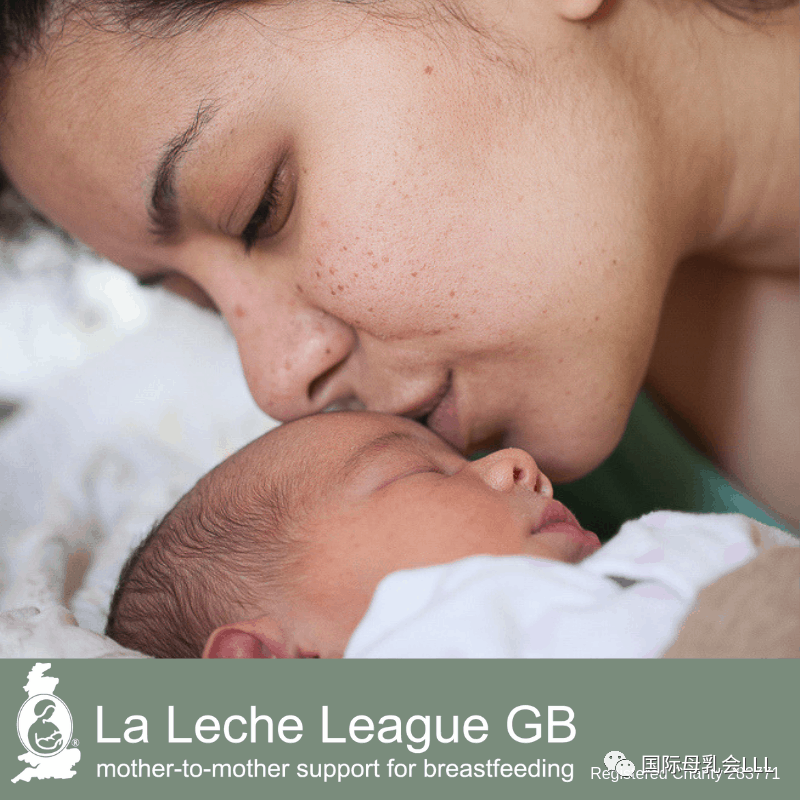点击上方 国际母乳会LLL 设为星标 ,获取哺乳信息

你和宝宝各自的需求,随着时间的推移每天都会变
母爱就是建立关系、滋养爱意和信任,使婴幼儿茁壮成长。通过母乳喂养展现的母爱是一种正常、自然和有效的育儿方式。母乳喂养有助于你培养和婴儿的关系,并满足他们的个人需求。它是一种满足婴儿对食物、爱、舒适和亲情连结需求的自然方式。
要花时间才能了解婴儿需要什么。一些育儿专家提倡对婴幼儿实行严格的生活规律。他们声称,如果一位母亲遵循他们的生活规律手册,她的宝宝就会非常满足。但每一个婴儿都是不同的。虽然我们一整天都遵循着一个可以预料的模式会感到很安心,但严格的喂养和睡眠规则往往无法满足每一个婴儿的需求。

常见情况
-
遵循生活规律的困难
-
充盈的乳房降低了产奶速度,可能会导致的问题
-
挤奶引起的问题
-
母乳: 均衡的膳食、饮料、零食
-
母乳喂养: 舒适同时联结感情
-
频繁的母乳喂养: 昼夜不停
-
吃一边还是两边乳房?
-
母乳喂养模式的调整
-
找到自己的节奏: 自由的感觉
-
把母乳喂养当成小事
-
期待意外
-
建立有用的模式
-
小婴儿的时光稍纵即逝


遵循生活规律的困难
一些婴儿会强烈反对硬加给他们的、不满足他们需求的生活规律。另一些孩子则很容易顺从,就算某个特定的生活规律不适合,他们也只是略微的表示不悦。
较早的喂奶信号包括吸吮手,舔嘴唇,把头转向你,或是烦躁。不要等到他们绝望了——哭泣是饥饿较晚的信号。试图“拉长”喂奶之间的间隔对你和宝宝来说都很难也会有压力,还会减少婴儿总的母乳摄入量。
排奶顺畅的乳房比充盈的乳房产奶更快。要鼓励婴儿频繁地哺乳,让你的乳房保持又软又舒适的状态。

充盈的乳房降低了产奶速度,可能会导致的问题:
-
婴儿体重增加缓慢或需要补充配方奶来维持适当的体重增加。
-
婴儿嗜睡,需要被唤醒并鼓励他们积极地哺乳以获得他们所需的食物。
-
哺乳时间过长
-
婴儿烦躁
-
乳房肿胀、乳管堵塞或乳腺炎

挤奶引起的问题
一些育儿专家建议吸奶来维持奶量以满足婴儿的需要。然而,如果婴儿和你的身体彼此协调,挤奶就会破坏这种微妙的平衡。
产奶量超出婴儿的需求会增加患乳腺炎的风险。你可能会经历乳汁流速过快或奶量过多,造成婴儿吐奶、呛奶或不停地含上吐出乳房。婴儿也可能肠绞痛或者烦躁。

母乳: 均衡的膳食、饮料、零食
就像成人一样,婴儿的进食也不规律——没人会每顿饭吃的量都一样,也不会总按定好的时间表吃饭喝水。如果随时能从乳房吃到奶的话,婴儿会平衡地摄入液体、卡路里、蛋白质、脂肪和其它营养素,所得皆所需。通常我们需要的只是让婴儿主导的信心。

母乳喂养:舒适又连结了情感
母乳喂养不仅仅是提供食物和饮料,还有助于你和婴儿彼此保持情感的连结和亲密。所以当婴儿感到疲倦、不开心或者不安时,他们会本能地要吃奶,因为这会帮助他们重新获得对周遭正确的感受。
许多母乳妈妈说,仅仅通过喂奶就能安抚宝宝,让他平静下来,是她们坚持母乳喂养的主要原因之一。它让每个人的生活都变得更加轻松、平和。

频繁的母乳喂养:昼夜不停
婴儿需要频繁地哺乳,以建立和维持你的产奶量,特别是在出生后最初的几周。母乳喂养在早上可能会间隔稍长,但婴儿到了晚上频繁地哺乳(或叫做“密集哺乳”)特别常见。
婴儿在更频繁地哺乳时,会得到富含脂肪的母乳。婴儿是在为晚上储粮,还在为第二天预订食物!(点击这里查看更多关于如何应对新生儿烦躁的夜晚的内容)

吃一边还是两边乳房?
有时婴儿想吃一边乳房,有时又想吃两边。你的宝宝知道他们需要什么——让他们先在第一边乳房上积极地吃奶,直到他们看起来吃满足了或者困了松口,再喂第二边乳房。
经过最初的几个月后,婴儿往往会成为真正高效的干饭人——所以如果他们十来分钟就吃完了奶,也不要惊讶哦!他们的尿布量和持续的体重增长会让你放心,他们确实吃饱了。(如何知道婴儿是否吃到了足够的母乳)

母乳喂养模式的调整
婴儿的生长速度和母亲的乳房存储容量将影响他们的哺乳模式。甚至天气也能造成差异——口渴的婴儿在炎热的天气里可能会吃更多次的奶。碰到婴儿猛长期、面对似乎特别饿的婴儿时,大多数母亲发现没必要挤奶来维持产奶量——更频繁地喂奶就能奏效。产奶量很快适应了婴儿的需求,喂养模式也在几天内稳定下来。


找到自己的节奏:自由的感觉
可预测性结合上一些灵活性,就能给你一种自由感,让你不再觉得束手束脚。起初,有了新生儿的生活似乎相当混乱,但是如果你放松并观察宝宝,会发现和缓的生活模式正在显现。你可以在此基础上,创建出适合你们两人的日常生活节奏。
严格的生活规律并不一定带给你更轻松的生活。局限于特定的规则、午睡时间和睡觉地点,会使外出活动、拜访朋友或度假变得异常复杂。
你和婴儿各自的需求,随着时间的推移每天都会变。当婴儿经历猛长期或生病时,跟随他们的节奏有助于你满足他们的需求。这也会给你信心在必要时去调整适应,比如应对预约就医或者假期的旅行安排时。
当婴儿依附于你而不是被捆绑在强加给他们的规则时,就不太可能出现问题,你会对安排一天的日程感到游刃有余。

把母乳喂养当成小事
就像你自己工作之余喝茶休息一样,可以试着把喂奶当成日常生活中灵活、随意的小事,而不是需要计划的大事件。

期待意外
不管你的宝宝平常的生活模式是什么,他们总有让你惊讶的时候。他们可能会在异于平常的时间里睡觉、睡得更久、或者根本不睡。他们两次吃奶间隔的时间可能更长了,或者突然想要更频繁地吃奶。
但是没必要惊慌——婴儿就是这样!我们可能永远也不知道这些变化的原因。生活要么回归到原有模式,要么自行建立一个新模式。婴儿将会在随后几年里继续成长,并不断给你带来惊喜。

建立有用的模式


早上——有一个合理、规律的起床、穿衣时间和模式会成为你一天的动力。
外出——外出可以帮助你规划一天的生活,让宝宝也娱乐一下,还带给你一种特意的目标感。你可以让这成为一个常规,让每个人都吃饱、准备好、然后走出家门。如果你要一早出门,前一天晚上就准备好所需的物品。
下午——婴儿通常会在中午左右准备睡觉。他们随着成长发育而各不相同,生活方式也随之变化。试着了解你的宝宝喂奶、清醒和睡眠的自然节奏,调整你的活动以适应他们。你自己也可以小睡或者休息一会儿,能帮助你在剩下的一天里充满能量。
晚上——和缓的睡前流程,如洗澡、哄睡、唱歌和哺乳都可帮助疲惫的婴儿放松下来并入睡。观察到婴儿烦躁、打哈欠和揉眼睛了,你就立即开始这个放松流程。有些婴儿天生是“夜猫子”,傍晚小睡一会儿,晚上就一直很精神。
家务——培养“可被打断”的能力会很有帮助。碎片化完成家务同时准备随时停下来照顾孩子,是满足每个人需求的成功之道。透过婴儿的眼睛看世界可以帮你放慢脚步、享受当下,而不是匆忙行事。养育婴幼儿是一项全职工作——期待集清洁工、厨师和园丁于一身这过于雄心勃勃了。要把有限的精力放在必要的事上。做那些孩子在身边你也能做的事,把特别棘手的事留在有人帮忙时做。几年之后当你回首往事,你不太可能希望那时自己做了更多的家务!




小婴儿的时光稍纵即逝
婴儿不会被你的爱和关怀宠坏的。照顾婴儿最简单的方法就是接受并满足他们对亲近的需求。记住,你最了解自己的孩子,接受对你有用的信息、建议和想法,忽略那些感觉不对的建议。你可以把生活的节奏和规律调整成吻合你自己、宝宝和家人各自需求的模式。

如果需要如何满足婴儿需求方面的支持,请联系我们的哺乳辅导或访问我们的网站。参加国际母乳会月度聚会与其他人分享经验、交流实用技巧也很有帮助。

该文献给所有的国际母乳会哺乳辅导,她们在过去六十年中慷慨地付出时间支持母乳喂养的母亲和家庭,并将持之以恒。
作者: 凯伦·巴特勒、苏·阿普斯通以及国际母乳会英国分会的母亲们
版权所有:国际母乳会英国分会 2020
更新于2022年6月
你可能也感兴趣的其他信息:

Rhythms and Routines
Mothering is about building relationships and nurturing the love and trust that enables babies and children to thrive. And mothering through breastfeeding is a normal, natural and effective way of doing this. Breastfeeding helps you nurture your relationship with your baby and meet their individual needs. It’s nature’s way of satisfying a baby’s need for food, love, comfort and connection.
It can take time to learn what a baby needs. Some childcare experts promote strict routines for babies and young children. They claim that if a mother follows their rulebook, her baby will be perfectly content. But every baby is different. While we may feel reassured if our day follows a predictablepattern, strict routines for feeding and sleeping often fail to meet the needs of individual babies.

Difficulties with routines
Full breasts slow down their rate of milk production, which may lead to:
Problems caused by expressing
Breastmilk: a balanced meal, a drink, a snack
Breastfeeding: comfort and connection too
Frequent breastfeeds: day and night
One breast or two
Breastfeeding patterns adjust
Finding your own rhythms: a sense of freedom
Think of breastfeeds as minor events
Expect the unexpected
Establishing helpful patterns
Babies are little for such a short time
Difficulties with routines
Some babies will object strongly to an imposed routine that doesn’t meet their needs. Others are easy going, and give only subtle signals that a particular routine isn’t right for them. Early feeding cues include hand sucking, lip smacking, turning their head towards you, or fussing. Don’t wait until they are desperate—crying is a late sign of hunger. Trying to ‘stretch’ the gaps between feeds is hard work and stressful for you both and can reduce your baby’s overall intake of milk.
A well-drained breast makes milk faster than a full one. Encourage your baby to nurse frequently enough to keep your breasts soft and comfortable.
Full breasts slow down their rate of milk production, which may lead to:
-
A baby gaining weight slowly or needing supplements to maintain adequate weight gain.
-
A sleepy baby who needs to be roused and encouraged to breastfeed actively to get the food they need.
-
Lengthy feeds.
-
A fussy baby.
-
Engorgement,blocked ducts or mastitis.
Expressing milk (pumping) can cause problems
Some childcare experts advise pumping to keep milk supply one step ahead of a baby’s needs. However, expressing can interfere with the delicate balance that happens when your baby and body are in tune with each other. Making more milk than your baby needs increases your risk of mastitis. You may experience fast flow and/or oversupply causing your baby to gag, splutter or come on and off the breast. Your baby might also have colic or be fussy.
Breastmilk: a balanced meal, a drink, a snack
Just like adults, babies feed irregularly—none of us eats the same amount at every meal, nor do we always follow a set timetable for eating and drinking. With easy access to the breast, babies will balance their intake of fluids, calories, proteins, fats and other nutrients so they receive exactly what they need. All that is usually needed is the confidence to let your baby take the lead.
Breastfeeding: comfort and connection too
Breastfeeding isn’t just food and drink. It also helps you and your baby maintain that connection and closeness with each other. So when your baby is tired or unhappy or upset, they instinctively ask to nurse because it helps them regain a sense of rightness with the world. Many breastfeeding mothers say that the ability to calm and comfort a baby just by nursing is one of the main reasons for carrying on. It makes life easier and more peaceful for everyone.
Frequent breastfeeds: day and night
Your baby needs to nurse frequently to establish and maintain your milk production, especially in the early weeks. While breastfeeds may be further apart in the morning, it’s very common for babies to nurse frequently (or ‘cluster feed’) in the evening. Babies receive fattier milk when they nurse more often. Your baby is stocking up for the night and putting in their order for tomorrow! (See here for more on coping with Fussy evenings with a newborn.)
One breast or two
Sometimes your baby will want one breast, at other times both. Your baby knows what they need—let them nurse actively from the first breast until they come off looking satisfied or sleepy. Then offer the second breast. After the first few months babies often become really efficient feeders—so don’t be surprised if they’ve finished in 10 minutes or so! Their nappy output and continuing weight gain will reassure you they are getting enough. (Is my baby getting enough milk?)
Breastfeeding patterns adjust
A baby’s growth rate and mother’s breast storage capacity will affect their nursing pattern. Even the weather can make a difference—a thirsty baby will probably nurse more in hot weather. When babies have growth spurts and seem extra hungry, most mothers find there’s no need to pump to keep up milk production—more frequent feeds will do the trick. Milk production quickly adapts to meet your baby’s needs and feeding patterns settle down within a few days.
Finding your own rhythms: a sense of freedom
Combining some predictability with flexibility can give you a sense of freedom and stop you feeling tied down. At first, life with a new baby can seem quite chaotic, but if you relax and observe your baby you will find gentle patterns emerging. You can build on these patterns, creating a daily rhythm to suit you both.
Strict routines don’t necessarily make life easier for you. Being tied to particular routines, nap-times and sleep places canmake getting out and about, visiting friends or taking holidays more complicated.
Your needs and those of your baby will change with time and from day to day. Following your baby’s rhythms will help you meet their needs when they have has growth spurts or are ill. It will also give you confidence to adapt when necessary, for example for a doctor’s appointment or holiday travel arrangements. When your baby is attached to you, rather than their routine, problems are less likely and you may feel more relaxed about managing the day.
Think of breastfeeds as minor events
Just as with your own tea-breaks, try thinking of feeds as minor and flexible events that fit in with everyday life rather than major events which have to be planned for.
Expect the unexpected
Whatever your baby’s usual pattern is, there will always be times when they surprise you. They might sleep at a different time, sleep longer, or not at all. They might go longer between feeds, or suddenly want to feed more frequently. But there’s no need to panic—this is how babies are! We may never know the reason for such changes. Life will either settle back into the original pattern or a new one will establish itself. Your baby will continue to grow and surprise you over the coming years.
Establishing helpful patterns
Morning – Having a reasonably regular time and pattern for getting up and dressed can be a springboard for your day.
Going out – Going out can help structure your day, entertain your baby and give you a sense of purpose. You can develop a routine for getting everyone fed, ready, and out of the house. Prepare what you’ll need the evening before if you need to get out early.
Afternoon – Babies are often ready to have a sleep somewhere around the middle of the day. Babies are all different and patterns change as they grow and develop. Try to tune in to your own baby’s natural rhythms of feeding, alertness and sleep and adjust your activities to match them. A nap or a rest for yourself, too, can help boost your energy for the rest of the day.
Night-time – A gentle evening routine, eg bath, rocking, singing and nursing can help a tired baby wind down to sleep. Watch for fussing, yawning and rubbing of eyes and start your wind down pattern promptly. Some babies are natural ‘night owls’, taking a late afternoon nap and being alert during the evening.
Household tasks – Developing the ability to be ‘interruptible’ is a real help. Completing housework in small ‘bites’ while being prepared to pause and attend to children can be a successful way to meet everyone’s needs. Seeing the world through your baby’s eyes can help you slow down and enjoy the present rather than rushing to get things done. Mothering babies and young children is a full-time job—it’s ambitious to expect to be a cleaner, cook and gardener at the same time. Concentrate on essentials. Do those things you can do with a baby around and save really tricky jobs for times when you have help. It’s unlikely you’ll look back in years to come and wish you had done more housework!
Babies are little for such a short time
You can’t spoil a baby with love and attention. The easiest way to care for a baby is to accept and meet their need for closeness. Remember, you know your baby best; take the information, advice and the ideas that are helpful to you and ignore those suggestions that don’t feel right. You can develop rhythms and routines that are in tune with your needs, and those of your baby and family.
For support in meeting your baby’s needs contact our LLL Leader or visiting our website. It can be helpful to share experiences with others at our monthly meetings where you can exchange practical tips.
Written by Karen Butler, Sue Upstone and mothers of LLLGB.
Pages you might also be interested in:
Adjusting to Motherhood
Breastfeeding Basics
Safe Sleep and the Breastfed Baby
Further Reading
The Womanly Art of Breastfeeding. LLLI. London: Pinter & Martin, 2010.
How Mothers Love and How Relationships Are Born. Stadlen, N. London: Piatkus Books, 2011.
What Mothers Do, Especially When It Looks Like Nothing. Stadlen, N. London: Piatkus Books, 2005.
Why Love Matters: How affection shapes a baby’s brain. Gerhardt, S. London: Routledge, 2004.
Kiss me! How to raise your children with love. Carlos Gonzalez. London: Pinter & March 2020
Rhythms & Routines is dedicated to all LLL Leaders who have given their time generously to support breastfeeding mothers and families over the past sixty years and continue to do so.

reference resources
参考资源
https://www.laleche.org.uk/rhythms-and-routines/

END
译者 | 传艳
审阅 | Lynn、张楠、Victoria
编辑 | 李热爱


更多阅读资料,
欢迎大家访问“国际母乳会LLL”官网:
https://www.muruhui.org/
分享
收藏
点赞
在看

本篇文章来源于微信公众号: 国际母乳会LLL
